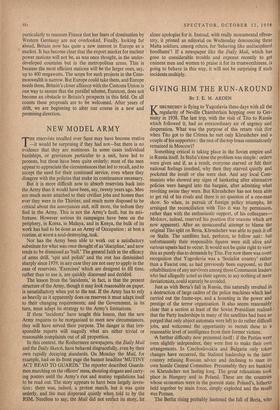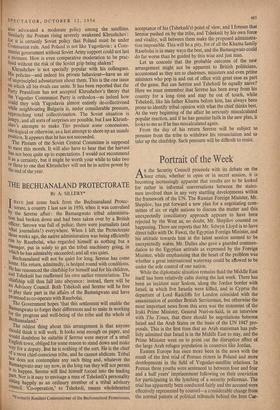GIVING HIM THE RUN-AROUND
BY J. E. M. ARDEN KHRUSHCHEV is flying to Yugoslavia these days with all the regularity of Neville Chamberlain hopping over to Ger- many in 1938. The last trip, with the visit of Tito to Russia which followed it, had an extraordinary air of urgency and desperation. What was the purpose of this return visit (for when Tito got to the Crimea he met only Khrushchev and a couple of his supporters : the rest of the top brass ostentatiously remained in Moscow)?
Something critical is taking place in the Soviet empire and in Russia itself. In Stalin's time the problem was simple : orders were given and if, as a result, everyone starved or felt their national feelings insulted, why then they starved quietly and pocketed the insult or else were shot. And any local Com- munists who showed any signs of hankering after alternative policies were hanged into the bargain, after admitting what revolting swine they were. But Khrushchev has not been able to get rid of his rivals and there is no question of a one-man show. So when, in pursuit of foreign policy triumphs, he arranged the reconciliation with Tito it was by permission, rather than with the enthusiastic support, of his colleagues— Molotov, indeed, reserved his position (for reasons which are now apparent). After an unsuccessful attempt to blame the original Tito split on Beria, Khrushchev was able to push it off on Stalin. The satellites had, perforce, to follow suit : but unfortunately their responsible figures were still alive and various upsets had to occur. It would not be quite right to view this as purely due to demands by Tito. For now there was overt recognition that Yugoslavia was a 'Socialist country' rather than a Fascist one, as had previously been supposed, so that rehabilitation of any survivors among those Communist leaders who had allegedly acted as their agents, to say nothing of mere deviationists, could scarcely be avoided. Just as with Benia's fall in Russia, this naturally resulted in a destruction of large cadres of the police machines which had carried out the frame-ups, and a lessening in the power and prestige of the terror organisation. It also seems reasonably clear that a section at least of the Soviet Prxsidium realised that the Party leaderships in many of the satellites had been so purged that only abject automata were left to do rather difficult jobs, and welcomed the opportunity to recruit these to a reasonable level of intelligence from their former victims.
further difficulty now presented itself : if the Parties were even slightly independent, they were free to make their own arrangements. In Czechoslovakia and Bulgaria only token changes have occurred, the Stalinist leadership in the latter country refusing Russian advice and declining to meet its own hostile Central Committee. Presumably they are banking on Khrushchev not lasting long. The great relaxations took place in Hungary and in Poland. These are the countries whose economies were in the poorest state. Poland's, hitherto held together by main force, simply exploded and the result was Poznan.
The Berlin rising probably hastened the fall of Beria. who also advocated a moderate policy among the satellites. Similarly the Poznan rising severely weakened Khrushchev: for it is certainly Soviet policy that Poland must be under Communist rule. And Poland is not like Yugoslavia : a Com- munist government without Soviet Army support could not last a moment. How is even comparative moderation to be prac- tised without the risk of the Soviet grip being shaken? Khrushchev is not specially popular with his colleagues. . policies--and indeed his private behaviour—have an air of unprincipled adventurism about them. This is the one issue On which all his rivals can unite. It has been reported that the Party Prxsidium has not accepted Khrushchev's theory that the Yugoslav Communist Party is orthodox—as indeed how could they with Yugoslavia almost entirely de-collectivised While neighbouring Bulgaria is, under considerable pressure, Pproaching total collectivisation. The Soviet situation is Jumpy, and all sorts of surprises are possible, but I see Khrush- chev's attempts to make Tito produce some concessions, ideological or otherwise, as a last attempt to shore up an unsafe Position. It appears that he has not succeeded. The Plenum of the Soviet Central Committee is supposed to meet this month. It will also have to hear that the harvest has not been quite up to expectations. I would not recommend a as a certainty, but it might be worth your while to take two or three to one that Khrushchev will not be in active power by the end of the year











































 Previous page
Previous page